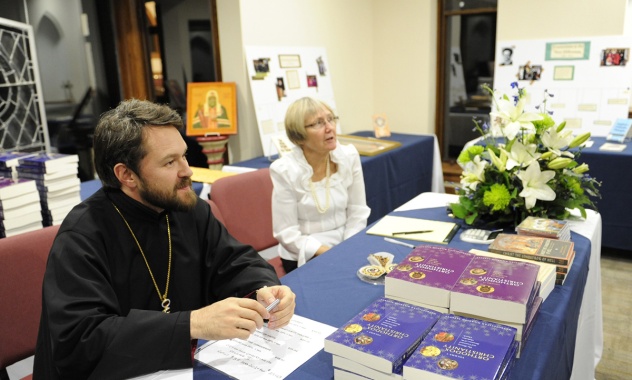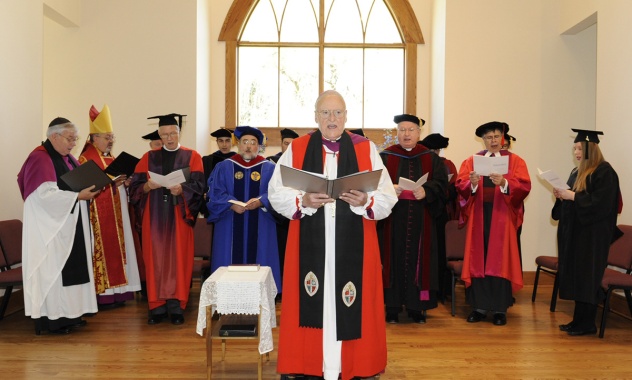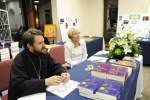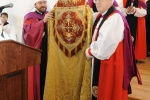Metropolitan Hilarion takes part in academic gathering in the Nashotah House Theological Seminary in Wisconsin, USA
On October 25-26, 2012, Metropolitan Hilarion of Volokolamsk, chairman of the Moscow Patriarchate’s Department for External Church Relations (DECR), currently touring the USA with the blessing of His Holiness Patriarch Kirill of Moscow and All Russia, visited the Nashotah House Theological Seminary in Wisconsin.
The Seminary, opened in 1842, is regarded a most conservative from among theological schools of the Anglican tradition. It was founded by the leaders of ‘The Oxford Movement,’ who strived to revive the Catholic tradition, and has become the centre of High Church Anglicanism in the USA.
His Holiness Tikhon, Patriarch of All Russia, visited the Nashotah House Seminary when he served as bishop in the United States. He was honoured the degree of doctor honoris causa on Bishop Charles Grafton’s initiative.
On October 25, Metropolitan Hilarion met with the dean and president of the Seminary, the Right Rev. Edward K. Salmon, an initiator of establishing the Anglican Church in North America in 2009 on the basis of dioceses and parishes of the Episcopal Church in the USA, which did not want to accept its leadership’s more liberal teaching. The Right Rev. Edward L. Salmon was one of the three bishops of the Episcopal Church in the USA, whom Metropolitan Kirill of Smolensk and Kaliningrad, chairman of the DECR, (now His Holiness Patriarch Kirill of Moscow and All Russia), sent a letter of support, emphasizing that the Holy Synod of the Russian Orthodox Church was open to contacts and cooperation with those members of the Episcopal Church in the USA who remain faithful to the Gospel moral teaching.
That same day in the evening, the second volume of Metropolitan Hilarion’s book “Orthodoxy” recently published by St. Vladimir’s Orthodox Theological Seminary in the English language was presented.
On October 26, Metropolitan Hilarion took part in the Nashotah House academic gathering, at which he was honoured the degree of doctor honoris causa. In his address, Metropolitan Hilarion said:
“Allow me to express my joy at being within the walls of the Nashotah House Seminary, a renowned theological educational institution, one of the oldest on the American continent and one of the leading in the Anglican world. Established one hundred and seventy years ago, the seminary has educated many Anglican clergymen and laymen who have served in various communities of the Anglican Communion.
A characteristic feature of the seminary has always been its striving after a healthy conservatism, its desire to preserve and develop the best in the Anglo-Catholic tradition. Nowadays, the word “conservatism” has acquired a negative shade of meaning. Yet, “Tradition” (gr. paradosis, lat. traditio) is one of the key notions of Christian theology, indicating the succession in passing on the church Truth from generation to generation – from Christ and the apostles to the present day. Christian Church cannot but be traditional and, therefore, conservative, in a positive sense of the word. Concern for preserving theological and moral Tradition intact and pure has always been one of the key features of Christian Church.
Theological schools have a special duty to preserve and further the church Tradition and to educate the young generation in the spirit of faithfulness to the teaching of Christ and the apostles. In the era when moral principles of society have been shaken under the influence of secular and liberal ideology, Christian conservatism and traditionalism are especially needed. Under the circumstances, the responsibilities of theological seminaries increase greatly.
Unfortunately, there are such tendencies within modern Anglicanism and Protestantism that cannot but worry us, Orthodox Christians. Many communities have embarked on the path of dissolving Christian theological and moral teaching and adapting it to the modern liberal standards. This tendency has also affected the Episcopal Church in the USA which used to maintain productive dialogue with the Russian Orthodox Church for many years. Unfortunately, we had to suspend the dialogue for the reasons that are well known and do not need to be mentioned at this distinguished gathering. We will be prepared to resume the dialogue provided the reasons which have led to its suspension are eliminated. And we believe that our dialogue has a future, if the Episcopal Church embarks again on the path of protecting traditional Christian values, including the moral ones. Under the present circumstances, we have to limit our contacts and maintain relations only with those representatives of the Episcopal Church who value the common Christian Tradition and try to preserve it.
We regard, and not without reason, your theological school as one such representative. The Nashotah House Seminary has always endeavored to protect Christian doctrine from corrosion and distortion. Contributing to its endeavours was the seminary’s interest in the spiritual heritage of the Orthodox Church which carefully preserves the common Christian Tradition. It is not fortuitous that in 1905 the Seminary honoured Bishop Tikhon (Belavin) with the degree of Doctor of Divinity honoris causa. Bishop Tikhon later became the Patriarch of Moscow and All Russia now is glorified as a saint. The seminary has not lost its interest in Orthodoxy; an agreement signed with St Vladimir’s Seminary in New York in 2009 testifies to this.
I have accepted the invitation to deliver a lecture at Nashotah House with great pleasure, bearing in mind that the seminary has always played a remarkable part in educating young people in the best traditions of Anglo-Catholicism, and that it has a special status in the structure of the Episcopal Church and shows particular interest in Orthodoxy.”
Bishop’s vestments, which His Holiness Tikhon once donated to Bishop Grafton, were now donated to Metropolitan Hilarion, who presented an icon of the Saviour as a gift to the Seminary.
That same day in the evening, Metropolitan Hilarion met with the leadership of the Bradley Foundation in Milwaukee. Discussed at the meeting was cooperation of the Foundation with the Russian Orthodox Church in the field of culture and religious education.




















